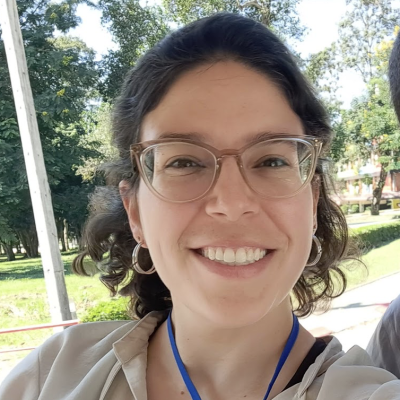Sessions / Workshop
A longer practical session.
Essential Visual Attention and Discrimination Skills for Struggling Readers #4240
English is the main medium of instruction in Singapore’s preschools. However, many young children with learning needs often face challenges in learning to read, write and spell. Despite attending regular preschool and English enrichment classes, these children often exhibit avoidance, inattention, and anxiety during reading activities both at school and home.
Possible variables affecting these struggles include inappropriate reading materials, anxiety, poor visual attention to print, weak working memory and vocabulary, low motivation, limited exposure to books, and English not being their first language.
This workshop will focus on how to support these children in engaging with print. It will highlight the application of an eclectic approach that emphasizes positive engagement, visual discrimination skills, visual memory, and motivation. It will demonstrate appropriate reading strategies to help their foundational reading skills. It will also present the use of developed physical and digital materials to engage them to reading.
ER 101: Starting Strong with Extensive Reading #4058
What is Extensive Reading, and how can we help students get started? What should they read, and how do we build and look after a library that will help them improve? How can we check if students are reading and making progress, without taking away the freedom that ER gives? This practical workshop gives an introduction to ER for teachers new to the approach. It also offers ideas for experienced practitioners who are looking for effective ways to introduce ER to their students, colleagues, or institutions. We will look at a range of rationales for ER including fluency development, vocabulary growth and affective benefits, and discuss how these can be communicated in different teaching contexts. The attendees will also share ideas about text selection, library development, assessment strategies, and the role of the teacher in an ER environment.
Page-Turner Practices: Practical, Captivating Approaches to Engage Readers #4395
We will show how Xreading and reading clubs have benefited students and how diversifying activities lead to student engagement and material retention. We will then break out into four small groups, each led by a co-presenter, to share activities involving different life skills and subjects. Attendees will rotate through each fifteen-minute station. In one group, participants work together to answer trivia questions to solve a letter cipher and decode story titles. They will then match the titles and characters descriptions to the correct stories. In another group, participants will read a short story and then the reading will disappear. Exercising their reading comprehension and imagination, the participants will recall and draw a specific character from the reading. Afterwards, presenters and participants will discuss the workshop activities; how they can be implemented in different classrooms and with different leveled students.
Writing Graded Readers #4035
This workshop will be a hands-on look at how graded readers are written and how ideas become books. Writing compelling graded readers requires more than just simplifying language—it involves thoughtful design, creative storytelling, and a deep understanding of learner needs. This interactive workshop will guide participants through the entire process of writing graded readers, from concept development to final draft. We will explore how to choose topics that engage learners, balance linguistic control with natural language, and build progression across levels. Participants will examine techniques for adapting existing texts and crafting original stories, incorporating CEFR-aligned vocabulary and grammar. Special attention will be given to voice, pacing and chapter structure among other elements. The session will also cover tools for planning, drafting, and editing. Whether you're new to writing or looking to refine your approach, this workshop offers practical strategies and inspiration to help you create effective, enjoyable graded readers.
Custom GPTs and ER-Based Mock Trials #4385
This workshop introduces a new system for integrating Extensive Reading (ER) and speaking activities for CEFR-B1 level upward. Using ER-based crime stories as the foundation, students prepare and perform classroom Mock Trials with structured role sheets for the judge, prosecutor, defender, defendant, and witness. A trial guide supports students in developing open/closed questioning skills. Participants will also be introduced to a custom GPT students can use before class to better understand the story and rehearse their roles. This AI assistant scaffolds comprehension and oral preparation, helping learners move from reading into fluent, role-based interaction. Even when guilt seems clear, sentencing decisions are not. Mock trials invite critical thinking about motive, age, intent, and appropriate punishment/rehabilitation. We will explore how to adapt existing ER crime stories using crowd-sourced sentencing guidelines and custom GPTs. If possible please read Chapters 1–4 of “Kittens Like Steam Clouds” before attending: https://vivabeppu.wixsite.com/vivabeppu/blog
Developing Extensive Reading Materials with Bloom and AI #4379
This workshop presents Bloom, a free, open-source software that enables users to easily create multilingual, leveled books for language learners. Originally developed to address the global shortage of reading materials in underserved languages, Bloom has supported the creation of over 19,000 books in more than 830 languages. Participants will receive hands-on training in using Bloom to develop open-access ER materials—whether to address resource scarcity or support educators interested in authoring their own texts. The session also introduces AI image tools (i.e., Leonardo AI, MidJourney, and Apple’s Image Playground) to generate illustrations for the texts. The workshop addresses both the possibilities and limitations of these tools. Bloom’s intuitive interface makes it ideal for local authors and educators, while AI-generated images raise occasional image distortion or inaccuracy concerns. By the end of the session, participants will be able to create open-source and level-appropriate ER materials.
Deepening Extensive Reading with the MINDSETS Framework #4136
Experts claim that extensive reading (ER) is an essential practice in language education. But students often consume texts passively, so how can we help learners engage more actively with stories and texts to deepen comprehension and retention? In this workshop, we’ll apply the MINDSETS Framework, an evidence-based approach that guides learners through eight generative learning strategies: Mapping, Imagining, Narrating (self-explaining), Drawing, Summarizing, Enacting, Teaching, and Self-testing. These strategies move learners beyond passive reading, fostering deeper comprehension, effortful retrieval practice, and long-term retention. Participants will experience hands-on activities using MINDSETS techniques to enrich ER practice, mapping key ideas, summarizing creatively, enacting scenes, peer teaching, and self-testing. Through structured exercises and discussion, attendees will leave with a clear actionable framework and practical, adaptable strategies to enhance ER instruction across various proficiency levels. Whether teaching younger learners or adults, this approach makes ER more interactive, reflective, impactful, and fun.
I Want to Read: My Journey of Learning Vietnamese by Reading for Pleasure. #4243
Students often see reading course books and test papers as a chore, lacking enthusiasm. Having developed a love for extensive reading by learning Vietnamese through Manga and novels, I have gained valuable insights into the process. This workshop begins with a 30-minute interactive presentation as attendees discover my own extensive reading journey through hands-on activities. A 60-minute practical session follows, where participants will learn how to help students select engaging readers, like Manga, based on the students’ interests. Then, work in groups to design follow-up activities using online tools and create questions to spark students’ curiosity for further reading. Participants will then connect these activities to their own teaching contexts and curriculums. 15-minute group discussions/peer feedback with questions concludes the workshop. Participants will learn how to uncover student interests, construct engaging questions that instill a genuine love of reading back into their classrooms, and integrating these into their curriculums.
中国广泛阅读实践与案例分享交流 (PERC交流会) #4471
1. PERC:英语广泛阅读的发展和市场变化 2. 一线老师关于泛读实践的案例分享 3. 讨论交流
Four Practical Tools to Add to the ER Teacher's Toolkit: A Workshop #4244
While appropriate difficulty and compelling content are essential for extensive reading, “linked skills activities” (Nation, 2024) that incorporate students` reading can further enhance learner engagement in coursework. This workshop aims to introduce four tools to use with ER and provide teachers with actual practice and takeaway materials. Reading Circles (Furr, 2009) include unique roles for students to address in discussions on common reading texts. Six Hats Thinking is a structured discussion format where participants first adopt a shared perspective before exploring others and can be used for selecting books. Mini-Bibliobattle is a 3-minute oral book report competition where attendees share their different favorite books and Q&A sessions decide a champion title. ER with Audio Support explains how reading-while-listening is key for development in young learners where novice readers decode words with phonics using audio/visual cues to aid comprehension. The sessions will share guidelines for instruction and feedback, and student reactions.















